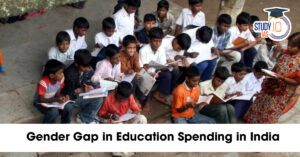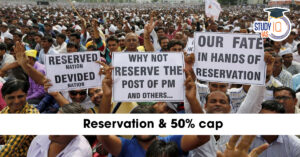Table of Contents
Context: According to the India Ageing Report 2023 (IIPS & UNFPA), people aged 60 years and above will constitute over 20% of the population by 2050. Women, on average, live 2.7 years longer than men. Yet, elderly women’s health issues remain neglected, understudied, and underserved.
Challenges Faced by Elderly Women
Social & Structural Barriers
- Patriarchal conditioning makes women prioritise family needs over their own health.
- Health decisions are often controlled by spouses or adult children, reducing women’s autonomy.
- Financial dependence: Nearly 60% of older women lack personal income; <20% can pay medical bills (vs 44% men).
- Digital divide: Very few elderly women use digital devices, restricting access to tele-health and health information.
Access Gaps in Healthcare
- Limited availability of female doctors and gender-sensitive facilities.
- Lack of support in navigating complex hospital procedures.
- Rural elderly women often travel long distances to access even basic health services.
Disease Burden & Neglect
- Non-communicable diseases (NCDs) like hypertension, diabetes, and cardiovascular illnesses have more severe outcomes in women post-menopause due to hormonal shifts.
- Bone health: Women are disproportionately affected by osteoporosis and arthritis; a higher risk of fractures reduces mobility and mental well-being.
- Cancers: Cervical and ovarian cancers often go undiagnosed until advanced stages.
- Neurodegenerative diseases: Alzheimer’s and dementia are more prevalent among women (due to longer lifespan and estrogen decline), but are underdiagnosed.
- Mental health: Only 1 in 10 elderly women with depression seek help (HelpAge India) due to stigma and poor access to counselling.
| Policy Gaps |
|
Way Forward
- Inclusive Health Policies: Integrate elderly women’s health into the National Health Policy and geriatric care schemes.
- Financial Security: Expand pensions, insurance coverage (Ayushman Bharat), and provide targeted subsidies for elderly women.
- Gender-Sensitive Healthcare: Increase training for female doctors and community health workers.
- Preventive Care & Screening: Routine NCD screening, osteoporosis check-ups, and awareness campaigns.
- Early detection of cancers through pap smears, mammography, and ultrasound.
- Digital & Community Interventions: Bridge the digital gender gap through literacy programmes.
- Use self-help groups and ASHA workers for outreach.
- Mental Health Support: Expand community-based counselling, social engagement centres, and destigmatise mental health care.
India’s elderly women face a triple burden: longer lifespans, poorer health in old age, and systemic neglect. To ensure healthy and dignified ageing, India must build gender-sensitive, inclusive health systems, secure financial and digital access, and promote preventive care.

 Geo-tagging of Buildings During Upcoming...
Geo-tagging of Buildings During Upcoming...
 Gender Gap in Educational Expenditure in...
Gender Gap in Educational Expenditure in...
 Reservation and 50% Cap: Constitutional ...
Reservation and 50% Cap: Constitutional ...

























